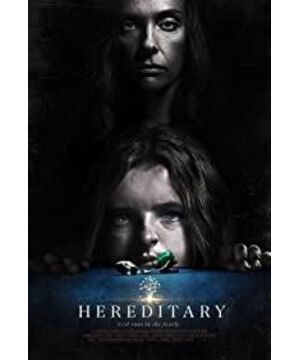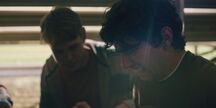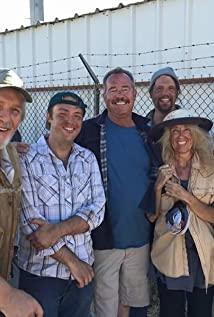After reading a lot of film reviews, there are also the director's personal explanations , and then I saw the questions from friends . I feel that these issues need to be discussed, so I will post a separate post and talk about my thoughts.
Before discussing these issues individually, I feel that there is a larger question that needs to be discussed first, and that is what role does the surreal factor play in this film? This is related to the setting of the movie itself, so it is very important.
I don't think the surreal factor played a role in this film, but rather family mental illness, cult beliefs, and the organized behavior of cultists played a decisive role (for this point, you can refer to this post ) .
The reason I think so is because I personally don't like horror thrillers that simply use ghosts and religious beliefs to be scary. Because once these elements are overused, many logically different places do not need to be carefully studied. However, if these elements are properly added to a film and the logic is self-consistent, I can accept it (such as this film).
It is also for the above reasons that when I explain the problems related to this film, I try not to attribute the answer to the surreal factor. In other words, Paimon itself does not have the so-called divine power, but the believers who believe in Paimon do make very abnormal actions.
20180823 update a paragraph to add:
The director said in an interview - While the film ends on a despondent note, with Peter's body being possessed by Paimon, Aster says there's another way to look at things. "Ultimately, the film is ultimately a success story from the grandmother's point of view and the coven's point of view," he notes, admitting, "That's a dark way to see it." -- which is similar to mine: to understand the story from a cultist's point of view, it seems a little dark, but More cruel, and therefore more terrifying.
The following are the questions and my personal understanding.
Question 1. Some people say that Annie knew there was something wrong with her grandmother. She tried to have an abortion in order to protect Peter from becoming Paimon's host. She also gave Charlie to her grandmother for Paimon to possess, so she should know that Charlie is dangerous to some extent. Yes, Charlie's broken bird's head also confirmed this, so why does Annie have to let Charlie and Peter go to that party, and when Charlie can't go and Peter doesn't want Charlie to go, she has to force her to go?
Personal understanding: Annie herself is also a member of the cult. The reason she wanted Charlie to go to the party was probably because she wanted Charlie to fall into the trap that the cultists had arranged before. Annie suffers from schizophrenia, good times and bad times, and when it's bad, she doesn't even realize it. She insisted that Annie go to the party, which can be said to be deliberately done by Annie's "alter self". Annie often sleepwalks, and even falls into a dream-in-dream state, which is enough to explain the problem.
To add a detail: When Annie's husband was burned to death, Annie saw her husband suddenly set on fire. Although this scene is actually presented in the movie, it is actually a scene conceived by Annie herself, not the real scene when her husband died. The real scene is that she watched the cultists bind her husband and burn him to death. I'll talk about this scene later.
20180823 update a paragraph to add:
I saw a friend who said that Annie arranged for Charlie to leave because Annie wanted to have sex with her husband. This explanation may sound funny at first, but it actually makes sense. The night Peter came home, Annie said "Okay good, they're home" in an almost gasping voice, her husband gasping too. However, despite this, I personally tend to think that sex is the result, not the purpose. After all, in such a big house, it is unlikely that married life cannot be carried out because of the children at home. I still think Annie may have been consciously involved in killing Charlie at the time, since she herself is a believer.
Question 2. Some people say that Charlie's death was orchestrated by the cult, but in fact Charlie was allergic to nuts in the cake, Peter was in a hurry to drive to the hospital and was frightened by a deer that suddenly appeared, and Charlie happened to be at that telephone pole again Opening the car window and sticking out of the car window seems to be a very random situation. How could a cultist orchestrate this series of coincidences?
Personal understanding: this accident is not a coincidence, at least someone deliberately arranged it. When answering the previous question, he said that Annie deliberately asked Charlie to attend the party, and that what Charlie eats may also be deliberately arranged by someone at the party. Before the crash, the deer on the road was dead—note that the dead deer may have been dropped here on purpose.
Of course, none of these surprises were enough to make Charlie's head hit the pole right in the middle. But let's take a step back and think that if Charlie's head didn't hit the telephone pole, then the cultists might look for other opportunities to create "accidents" again. In other words, Charlie has to die, because only after she dies can Paimon change hosts.
Question 3. So was Paimon conscious inside Charlie when she had an accident? If so, what good would killing Charlie do for him? That would mean nothing to him until he could attach Peter, and it didn't do him any good, so what was his appeal to kill Charlie?
Personal understanding: Believers believe that Paimon needs to leave Charlie, not Charlie. Charlie is a woman, but Paimon needs to be in a man's body so that her power can be maximized.
Killing Charlie is something the cultists have to do, and the only way to free Paimon in a "free state", so that it can better attach itself to Peter.
Question 4. Annie's brother committed suicide. If it was his brother's soul that resisted paimon's possession, why didn't Paimon simply attach himself to him when his brother's soul disappeared because of death and struggled to make the latter scene? ?
Personal understanding: Believers believe that Paimon's power is not so strong. If the host's power is too strong (to use Chinese superstition, it is "too strong yang"), then Paimon cannot live. The host must be alive and must complete the corresponding possession ritual, otherwise the host cannot be possessed, so Paimon failed to possess his brother.
Question 5. Some people say that Paimon was able to end up possessing after Peter committed suicide, which again doesn't make sense because in Annie's brother's case the body that killed himself was not used for possessing.
Personal understanding: After Peter fell from the attic, he didn't actually die. He fell into the garden, which had soft soil on its surface, so it was normal not to die. Just kidding, he might have really broken his mind. We don't know how long it took from the time he fell to wake up. But what is certain is that during this time, those believers moved the bodies in the attic.
One small detail, these cultists also killed his family's dog. It's also important to note that the scenes with the dogs are, without exception, real ones, not ones imagined by Annie.
Question 6. In addition, Peter was actually frightened and panicked and fell from the window, not suicide
Personal understanding: Yes, he did not commit suicide, but his whole person is very fragile, so he can become a boarding object.
Question 7. Was Peter still alive when he was finally possessed? If it is alive, it means that paimon can actually be possessed at any time, so why bother? If he was already dead, why wasn't he attached to Annie's brother who committed suicide? Anyway, just want a body
Personal understanding: Peter is still alive, but he is so fragile that he has lost his mind. At this time, Paimon can be possessed. This is also the purpose of tossing for such a big circle: not to kill you, but to make you exhausted. Annie's brother may have committed suicide on purpose rather than by accident. Note that the two cases are not the same. A pure body of death cannot become a host, but Peter is not dead here.
Question 8. How did Annie and Dad die?
Personal understanding: It is certain that Joan and Annie's mother are good friends and therefore have the keys to their home. When Annie learns the "truth" (in quotes because she doesn't know the whole truth), she thinks letting her husband burn the book will stop everything from happening. But it's not the case. Burning the book won't help, because at this time all the cultists have set up a plan to let Paimon possess Peter.
We can figure out what happened when Annie wanted her husband to burn the book —the husband tried to call the police, but at this time, Joan and other cultists showed up, tied him, and eventually burned him to death. In the same way, Joan was also killed. Peter saw his father's tragic death on the first floor, and after being too frightened, he imagined that the murderer was his mother, but in fact his mother was already dead at this time. The mother he saw at this time was his own imagination. So, before Peter ran into the attic, all he saw was an illusion. The thumping sound he heard might be his own heartbeat (no joke, it's possible).
However, what he saw in the attic later was real, made by cultists. When Annie cut her own neck, it might not be her cutting it, but someone else cutting it. The naked men and naked women that appeared were also real, they were used to scare him on purpose, or something that was necessary for a certain ritual. There are also naked men and naked women in the garden, and they are all real scenes.
Question 9. Who got Grandma's body in the attic?
Personal understanding: According to the previous explanation, it is likely to be arranged by cultists such as Joan. Later, the transfer of the corpse and the concave shape of the corpse were also done by the believers. Everything is not a supernatural event, it is made by living people.
Finally, I will share my personal review of the film.
If the surreal factor is not considered, the film does not justify itself in some places, or it does not have time to explain, which makes the audience feel confused. This kind of doubt weakens the sense of horror brought by the film, and even feels that the ending is inexplicable.
I didn't have time to explain, in fact, because some information needed to be displayed in detail by the director in the film, but the director's presentation form and rhythm were problematic, so that the audience did not know why for a while.
For example, the director has often shown the setting of the story directly in words, almost lazy, the medium is too flat, and the content is too much. Without these flaws, the finale would be much more understandable and not abrupt or even hilarious.
If you consider the surreal factor, this movie is simply another story (from a surreal point of view, you actually have a lot to say about it, and it is recommended to read the interpretation of this friend )
Granted, it's not a perfect movie, but there's a lot to learn from, and different angles to watch.
Finally, if you have any other questions, you can leave a message to communicate~
View more about Hereditary reviews











